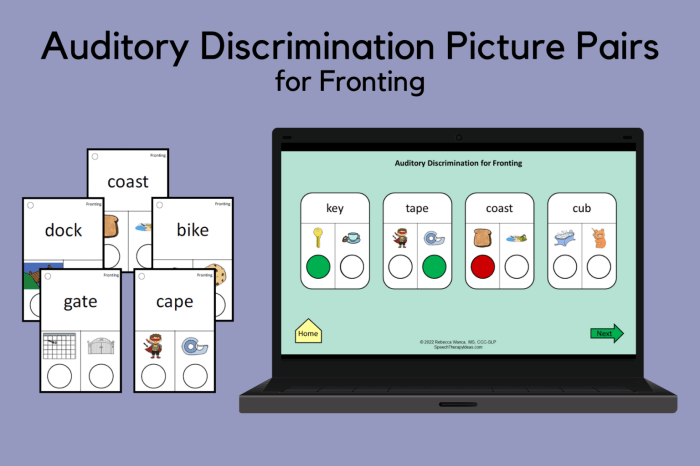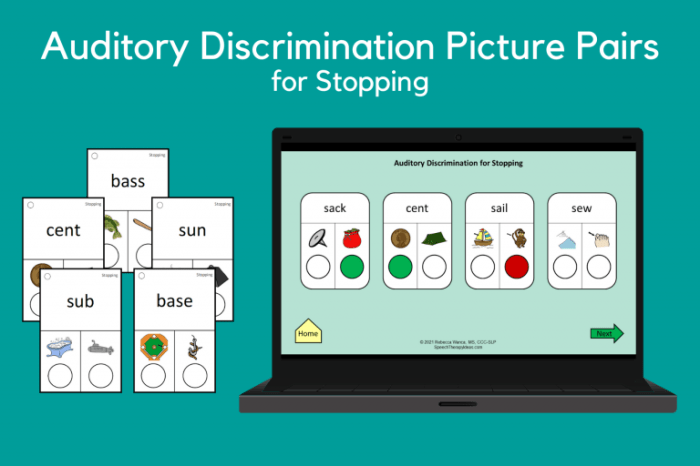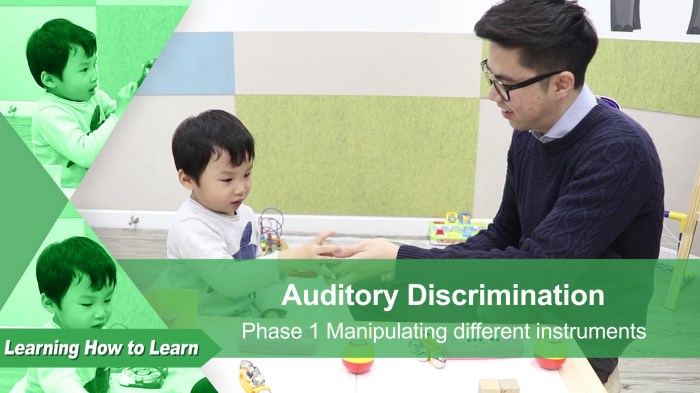Auditory discrimination goals speech therapy – Auditory discrimination goals in speech therapy are paramount to fostering speech clarity and intelligibility. These goals aim to refine an individual’s ability to perceive and differentiate between distinct speech sounds, paving the way for improved speech production and communication.
Auditory discrimination encompasses a range of skills, including the ability to distinguish between phonemes (individual speech sounds), syllables, and words. These skills are essential for comprehending spoken language and producing intelligible speech.
Auditory Discrimination Goals in Speech Therapy

Auditory discrimination is the ability to distinguish between different sounds. It is an essential skill for speech and language development, as it allows us to understand and produce speech. Auditory discrimination skills are also important for reading, writing, and spelling.Speech
therapists can help individuals develop auditory discrimination skills through a variety of exercises. These exercises may include:
- Identifying different sounds in words
- Matching words that sound alike
- Identifying the first and last sounds in words
- Blending sounds to form words
- Segmenting words into individual sounds
Assessing Auditory Discrimination Skills, Auditory discrimination goals speech therapy
There are a variety of methods that can be used to assess auditory discrimination skills. These methods include:
- Informal assessments
- Standardized tests
Informal assessments are typically conducted by speech therapists during speech therapy sessions. These assessments may include tasks such as asking the individual to identify different sounds in words, match words that sound alike, or blend sounds to form words.Standardized tests are formal assessments that are designed to measure auditory discrimination skills.
These tests are typically administered by a speech therapist or other qualified professional.
Developing Auditory Discrimination Skills
There are a variety of methods that can be used to develop auditory discrimination skills. These methods include:
- Auditory discrimination exercises
- Speech therapy
Auditory discrimination exercises are activities that are designed to help individuals develop auditory discrimination skills. These exercises may include tasks such as identifying different sounds in words, matching words that sound alike, or blending sounds to form words.Speech therapy is a type of therapy that is provided by a speech therapist.
Speech therapy can help individuals develop auditory discrimination skills through a variety of methods, such as auditory discrimination exercises, articulation therapy, and language therapy.
The Role of Technology in Auditory Discrimination Therapy
Technology can be used to enhance auditory discrimination therapy. There are a variety of software programs and apps that can be used to provide auditory discrimination exercises. These programs and apps can be used in conjunction with traditional speech therapy methods to help individuals develop auditory discrimination skills.
Auditory Discrimination Therapy for Specific Populations
Auditory discrimination therapy can be tailored to the specific needs of different populations. For example, auditory discrimination therapy for children may focus on developing basic auditory discrimination skills, such as identifying different sounds in words and matching words that sound alike.
Auditory discrimination therapy for adults may focus on more complex skills, such as blending sounds to form words and segmenting words into individual sounds.
General Inquiries: Auditory Discrimination Goals Speech Therapy
What is the significance of auditory discrimination in speech therapy?
Auditory discrimination is crucial in speech therapy as it enables individuals to perceive and differentiate between distinct speech sounds, which is essential for comprehending and producing intelligible speech.
How are auditory discrimination skills assessed?
Auditory discrimination skills can be assessed through various methods, including standardized tests and informal assessments. Standardized tests provide normative data for comparison, while informal assessments allow for a more individualized evaluation.
What are some effective strategies for developing auditory discrimination skills?
Effective strategies for developing auditory discrimination skills include engaging in auditory discrimination exercises, such as identifying and discriminating between different speech sounds, syllables, and words. These exercises can be incorporated into various activities, such as games, drills, and storytelling.


